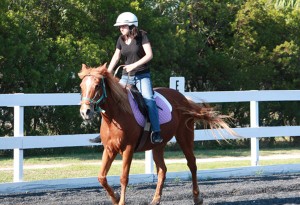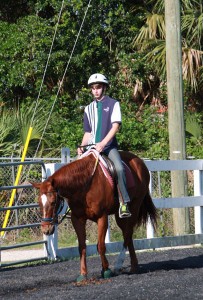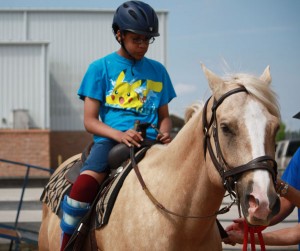Equine Therapy for Special Needs Kids
Talia Finder loves nature and looks forward to her weekly sessions with Ginger, her therapy horse at Freedom Ride in Orlando. Although Talia doesn’t have an official diagnosis, the 17-year-old hardly spoke to anyone until the sixth grade, in what her mother, Teresa Finder, called selective mutism.
Orlando. Although Talia doesn’t have an official diagnosis, the 17-year-old hardly spoke to anyone until the sixth grade, in what her mother, Teresa Finder, called selective mutism.
In the eight years Talia has been attending therapy sessions at Freedom Ride, located on the former grounds of the Ben White Raceway on Lee Road, the teen’s social skills and balance have improved markedly. “It’s been therapeutic both physically and emotionally,” Teresa Finder says referring to her middle child. “Creative programs such as this equine therapy can definitely make a difference in a kid’s life. This was certainly one of the things that helped with Talia’s muteness.”
Therapeutic riding for individuals with disabilities has been around for decades, but in recent years, more centers have popped up around the country and the world. Activists are convinced of the benefits that equine therapy provides, from strengthening the core of those with physical disabilities to helping children with autism become more social. “If they don’t have use of their legs, it’s like the horse is their legs. Riding strengthens all their core muscles,” says Marianne Gray, executive director of Freedom Ride. “Most [participants] can’t play football or softball like their siblings, but they can get on a 1,000 pound horse and be a leader.”
 Giles Connolly, 15, was also non-verbal, a side effect of his autism, but thanks to Freedom Ride and participation in Special Olympics, the teen has exited his shell a bit, now speaking with peers and dancing at parties. “The theory at the time of his autism diagnosis was that, if he didn’t speak by age 7, he never would,” says Niall Connolly, Giles’ dad. “He always enjoyed the horses. They gave him an interest at a time when he really didn’t know what he wanted to do.”
Giles Connolly, 15, was also non-verbal, a side effect of his autism, but thanks to Freedom Ride and participation in Special Olympics, the teen has exited his shell a bit, now speaking with peers and dancing at parties. “The theory at the time of his autism diagnosis was that, if he didn’t speak by age 7, he never would,” says Niall Connolly, Giles’ dad. “He always enjoyed the horses. They gave him an interest at a time when he really didn’t know what he wanted to do.”
In addition to helping him overcome his shyness and muteness, Giles has physically benefitted from the therapy sessions. “On a simple level, I think it’s helped his posture because he has to sit up straight in the saddle,” Nially Connolly says. “He just continues to amaze us.”
Across town, at Heavenly Hoofs Therapeutic Riding Center at Osceola Heritage Park in Kissimmee, the Lia siblings help prepare their horses before mounting and taking the reins.
For three years, the siblings, who are all adopted by nurse Pat Lia, have used equine therapy to benefit their various disabilities, from spina bifida and cerebral palsy to bipolar disorder and Asperger’s, a variation of the autism spectrum. “This has boosted their confidence,” Lia says, adding that each of her children – Shelley, 11, and Sean, Melissa and Robert, all 13 – has benefitted both physically and emotionally.
has boosted their confidence,” Lia says, adding that each of her children – Shelley, 11, and Sean, Melissa and Robert, all 13 – has benefitted both physically and emotionally.
The siblings take their weekly classes together. They play the dice game, where they roll dice and then have their horse take the number of steps they rolled. They also complete a trail course, which includes opening a gate to walk their horse through and weaving around barrels. Their favorite game is the water balloon toss, which is even more fun when the balloon bursts, soaking their volunteers or instructor.
“Typically, options are limited for these kids,” comments Abby Horner, operations manager of Heavenly Hoofs, but with equine therapy, she says the children can participate in horse shows where they earn ribbons. “The kids really like to develop a relationship with the horse. Horses just have something magical about them; it’s an emotional connection.”
For 10 years, lead instructor Caity Wall has worked with hundreds of children, helping them build their potential with the gentle giants. “The disabilities are so varied; individual goals for each student can be so different,” she says. “The outside of a horse is good for the inside of a person.”
For Sean Lia, who has spina bifida, leaning over to pluck a rubber duck from a bucket of water before transferring it to another bucket, all while astride his horse Willy, is a huge feat. The teen, who wears braces on both legs, takes advantage of a ramp to mount the horse. “Sean and Shelley’s balance has been helped by this,” mom Pat Lia notes. Shelley has cerebral palsy. “I think this has helped them both a lot.”
Equine therapy is not covered by insurance and is only available to those who are signed off by a doctor. “Even though it’s therapeutic, riding is considered recreational and is not picked up by insurance,” Gray points out. The horses participating in these programs are donated by individuals – some are former rodeo performers or were pets relinquished after a child’s departure for college – but it takes a special animal to handle individuals with special needs.
“The horses need to be bombproof. They can’t be hyper-sensitive,” Horner notes. “They have to be able to put up with a lot and be very patient.”
In addition to the therapeutic riding sessions at the programs’ respective properties, the horses are also trailered to local children’s hospitals to work with sick children, allowing them to brush and feed them and learn about the animals through storytelling. Foster children were also invited to Freedom Ride last month to reap the benefits of interacting with these animals.
“People are familiar with other successful animal therapies, such as seeing-eye dogs; equine therapy is just another method,” Gray of Freedom Ride says. “They’ve heard horses have a gentle spirit.”
Freedom ride is currently looking for a donation of 10 to 20 acres of land to relocate its facility because their lease with the city of Orlando will expire in 2016. The move would also allow the program to expand and help kids with an even wider range of special needs.
Both organizations are also in need of volunteers.
Visit www.heavenlyhoofs.org or www.freedomride.com for more information.









